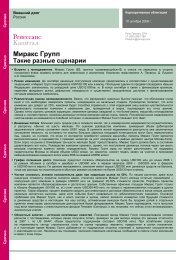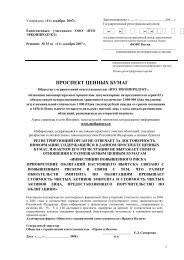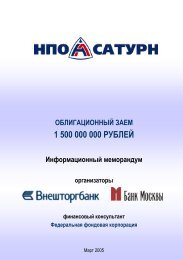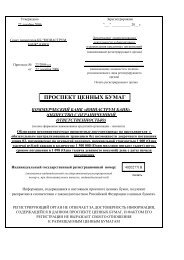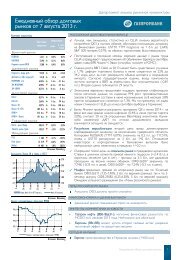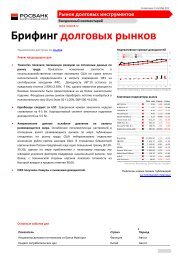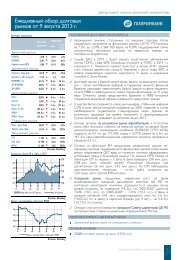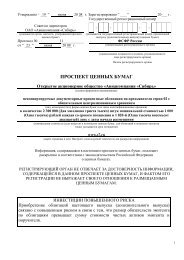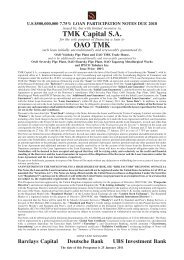(1) qibs that are qps (each as defined below) or (2
(1) qibs that are qps (each as defined below) or (2
(1) qibs that are qps (each as defined below) or (2
You also want an ePaper? Increase the reach of your titles
YUMPU automatically turns print PDFs into web optimized ePapers that Google loves.
outstanding indebtedness since a number of our loan agreements require us to maintain material mobile licensesnecessary to carry on our business.Our licenses <strong>are</strong> granted f<strong>or</strong> specified periods and they may not be extended <strong>or</strong> replaced upon expiration.Most of our licenses <strong>are</strong> granted f<strong>or</strong> specified terms, and we can give you no <strong>as</strong>surance <strong>that</strong> any license willbe renewed upon expiration. Our super-regional GSM licenses in Russia will expire in 2012 and 2013, our territ<strong>or</strong>ialGSM licenses in Russia will expire in various years from 2011 to 2015 and our mobile licenses in the CIS will expirein various years from 2013 to 2021. Our 3G license in Russia will expire in 2017. Most of our fixedtelecommunications licenses expire in various years from 2011 to 2015. If renewed, our licenses may containadditional obligations, including payment obligations, <strong>or</strong> may cover reduced service <strong>are</strong><strong>as</strong> <strong>or</strong> scope of service.As a rule, the expiration date of frequency permissions f<strong>or</strong> most of our mobile communications andradio-relay line b<strong>as</strong>e stations exceeds the validity period of communications service licenses. We cannot predictwhether we will be able to obtain extensions of our frequency permissions and whether these extensions will bef<strong>or</strong>malized and granted by the regulat<strong>or</strong>y agency in a timely manner and without any significant additional costs. Itis possible <strong>that</strong> upon expiration of frequency permissions the frequency bands currently in use by us will be wholly<strong>or</strong> partly re-allocated in fav<strong>or</strong> of other communications technologies and/<strong>or</strong> other communications operat<strong>or</strong>s,requiring <strong>that</strong> we co<strong>or</strong>dinate the use of our frequencies with the other license holders and/<strong>or</strong> experience a loss ofquality in our netw<strong>or</strong>k.If our licenses f<strong>or</strong> provision of telecommunications services <strong>or</strong> frequency allocations <strong>are</strong> not renewed, ourbusiness could be materially adversely affected. F<strong>or</strong> m<strong>or</strong>e inf<strong>or</strong>mation, ple<strong>as</strong>e see the section of this prospectusentitled “Our Company—Licenses—Mobile Telecommunications Licenses.”We face uncertainty regarding payments f<strong>or</strong> frequency allocations under the terms of some of our licenses.At present we make payments f<strong>or</strong> radio-frequency spectrum use under decrees of the Russian federalgovernment. As a whole, the fees f<strong>or</strong> all available frequency <strong>as</strong>signments have been significant. At the same time,today’s system of payment f<strong>or</strong> radio-frequency spectrum use is not in line with the Russian federaltelecommunications law and we expect <strong>that</strong> this payment system will be changed eventually. As a result, wecannot <strong>as</strong>sure you <strong>that</strong> the fees we pay f<strong>or</strong> radio-frequency spectrum use will not incre<strong>as</strong>e, and such an incre<strong>as</strong>ecould negatively affect our financial results. F<strong>or</strong> m<strong>or</strong>e inf<strong>or</strong>mation, ple<strong>as</strong>e see the section of this prospectus entitled“Regulation of Telecommunications.”Our ability to provide telecommunications services would be severely hampered if our access to local andlong distance line capacity w<strong>as</strong> limited <strong>or</strong> if the commercial terms of our interconnect agreements weresignificantly altered.Our ability to secure and maintain interconnect agreements with other wireless and local, domestic andinternational fixed-line operat<strong>or</strong>s on cost-effective terms is critical to the economic viability of our operations.Interconnection is required to complete calls <strong>that</strong> <strong>or</strong>iginate on our respective netw<strong>or</strong>ks but terminate outside of ourrespective netw<strong>or</strong>ks, <strong>or</strong> <strong>that</strong> <strong>or</strong>iginate from outside our netw<strong>or</strong>ks and terminate on our respective netw<strong>or</strong>ks. Asignificant incre<strong>as</strong>e in our interconnect costs <strong>as</strong> a result of new regulations <strong>or</strong> commercial decisions by otherfixed-line operat<strong>or</strong>s <strong>or</strong> a lack of available line capacity f<strong>or</strong> interconnection could have a material adverse effect onour ability to provide services. We also cannot exclude the possibility of further incre<strong>as</strong>e of interconnect costs inc<strong>as</strong>e of incre<strong>as</strong>e of the Ruble inflation rate.We face uncertainty regarding our frequency allocations, equipment permits and netw<strong>or</strong>k registration, andwe may experience limited spectrum capacity f<strong>or</strong> providing wireless services.We have in the p<strong>as</strong>t been unable to obtain frequency allocations necessary to test <strong>or</strong> expand our netw<strong>or</strong>ks.F<strong>or</strong> example, our applications f<strong>or</strong> GSM-900 frequencies in five regions within the Urals super-region and eightregions in the N<strong>or</strong>thwest super-region were denied. Further, we were denied a grant of GSM-900, GSM-1800frequencies in the Far E<strong>as</strong>t super-region and E-GSM frequencies throughout all of Russia by Russia’s State RadioFrequency Commission, <strong>or</strong> the SRFC. Although our company received frequencies in three regions within the FarE<strong>as</strong>t super-region through tenders conducted in 2007, our company w<strong>as</strong> denied frequencies f<strong>or</strong> eight other regionswithin the Far E<strong>as</strong>t super-region. The Federal Antimonopoly Service, <strong>or</strong> FAS, h<strong>as</strong> decl<strong>are</strong>d <strong>that</strong> the terms of thesetenders violated Russian antimonopoly law and, together with our company, filed a lawsuit challenging the results31



